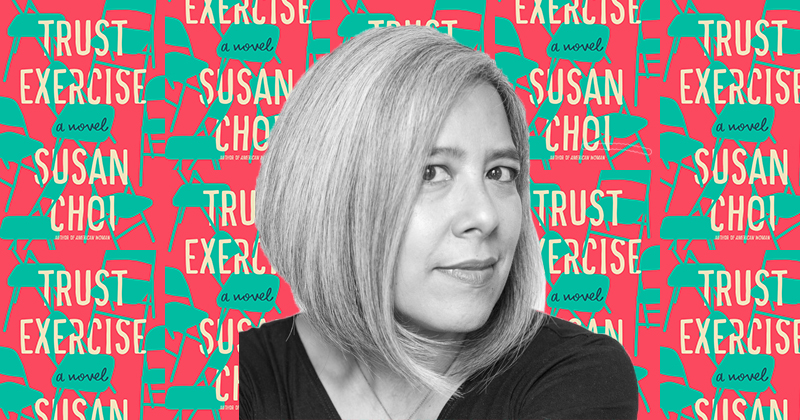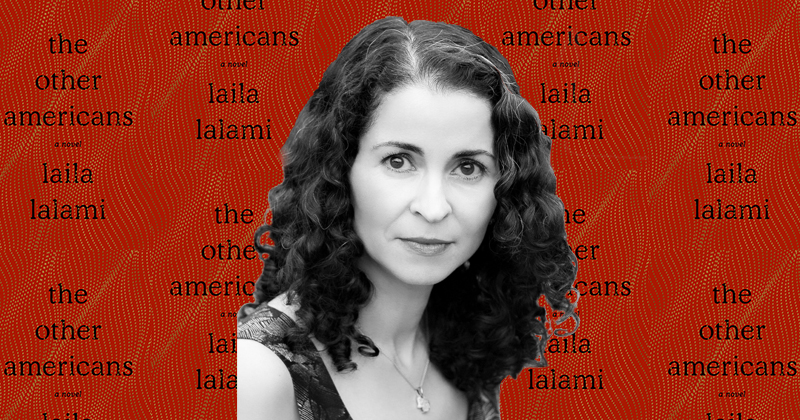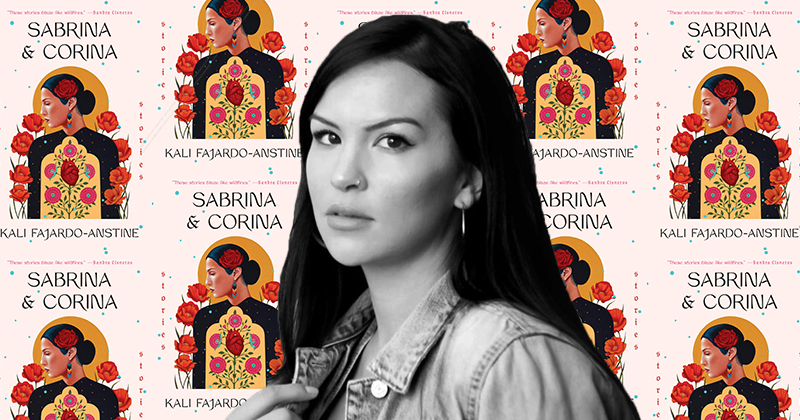
Meet the Finalists for Next Week's National Book Awards
Interviews with Some of Our Finest Living Writers
FICTION

Susan Choi, author of Trust Exercise (Henry Holt)
What’s the best book you read this year?
Stefan Hertmans’ War and Turpentine. It’s not a 2019 book, but it’s what I read this year that most blew me away.
What time of day do you write?
Morning, because it’s the best time for everything, for me. Unfortunately that means it’s also the best time for me to do everything else.
How do you tackle writer’s block?
When I actually do tackle it, I set a word count goal and don’t let myself get up for lunch unless I’ve met it. But doing that takes resolve, so a lot of the time I don’t tackle writer’s block. I let it win!
Which book(s) do you return to again and again?
Alice Munro’s Selected Stories and The Great Gatsby, in both cases for their pacing, all the stuff those authors leave out to get you where they want to get you.
If you have a day job, what is it? How do you negotiate writing and working?
I teach creative writing, which both feeds by own creative writing and erodes it depending on whether I can keep the fine balance between enough teaching—I like teaching—and too much teaching. It’s really hard to do that. It seems to come down to whether or not I can teach and still have whole days of the week where I don’t engage with my teaching at all, but only my own writing. Some weeks yes, many weeks no.
What’s the best writing advice you’ve ever received?
Write every day. See above for how well I’m doing at this.
Trust Exercise is both an affecting narrative and a thrilling meta-narrative—its form is a huge part of its impact. How did the story evolve in your brain, and did you have any particular literary models for it?
The book evolved over time without, it seems to me, a lot of influence from me. I was primarily working on something else the whole time I was writing TE, and I only returned to TE when I was stuck on the other thing and felt compelled to sneak off, so it was always fun. And, the stakes felt low. I felt as though it didn’t really matter how TE evolved because I wasn’t really writing it. In retrospect I think Jennifer Egan’s The Keep was a clear model—I adore that book—but I wasn’t aware of any models during the actual writing.
How do you feel about Trust Exercise being described as a #MeToo novel?
The completion of this book and the eruption into national consciousness of #MeToo coincided, so it seems inevitable and apt, and I’m grateful a book of mine could be in conversation with something that I think is so important. I also hope the book is large enough to continue to hold that space for #MeToo while connecting with additional sources of meaning, going forward.
*

Julia Phillips, author of Disappearing Earth (Knopf)
Who do you most wish would read this book?
I wish my grandmother could’ve read it. Stories she told me and books she gave me have left their traces all over this novel; there are scenes inspired by her childhood, moments shaped by her favorite authors, bits of dialogue I imagine she might say. I would have loved to hear her thoughts on this book. Especially as she got older, she never hesitated to share her opinions, and I imagine she would have told me exactly what worked and what didn’t for her.
What’s the best book you read this year?
Women Talking by Miriam Toews. Reading that book knocked me to the ground. It’s been months and I still haven’t gotten back up.
Who was the first person you told about making this list?
My partner. He’s supported every stage of the development of this novel, from the first days outlining the idea to the year I spent abroad researching it to the many, many rounds of revision to all the publication stress and excitement. Sharing this news with him now was the happiest thing.
Which non-literary piece of culture—film, tv show, painting, song—could you not imagine your life without?
I don’t want to imagine my life without the comedy podcast Hollywood Handbook. Each episode is the highlight of my week. I recommend it to people all the time, and folks inevitably come back indignant and disappointed after they listen. But they just need to try harder to enjoy it!! Please subscribe while keeping its slogan in mind: “Hollywood Handbook: a podcast that only takes 15-20 episodes to get”!!!
What’s the best writing advice you’ve ever received?
This answer also relates to a comedy podcast, weirdly enough. Years ago, I listened to the actor Will Ferrell tell a story about art and his father on an episode of WTF with Marc Maron. Ferrell said that when he decided to move to Los Angeles to pursue comedy, his dad, who was a touring musician, said, “If it was all based on talent, I wouldn’t worry about you, because I think there’s really something there. But you have to remember, there’s a lot of luck. And if you get to a certain point—three years, four years, five years—and you feel like it’s too hard, don’t worry about quitting. Don’t feel like you failed. It’s okay to pick up and do something different.”
That advice hit me hard. Since I was a little kid, I’ve dreamed of being an author, someone whose work was on shelves in libraries and bookstores. That vision of the future sometimes energized and inspired me but sometimes poisoned every private pleasure in my life. By the time I was listening to that podcast, ambition had consumed the joys of writing and reading. It overwhelmed me. With every rejection, I felt more sure that my work was bad and that I, too, was bad, because if the work was good and I was good, wouldn’t other people have told me so by that point? Shouldn’t I have gotten the validation I was seeking? I did feel like a failure.
But good ol’ Will Ferrell told me and the rest of that interview’s audience that making a career in the arts depends on luck and opportunity and timing, factors that are out of our control and independent of our work. Your career is not a referendum on your talent or goodness. There’s no reason to beat yourself up. Listening to that, I felt free, for the first time in ages, from self-loathing. His advice let me go back to the page, where writing finally seemed less like a high-stakes audition for becoming one of my childhood heroes and more like the quiet, strange, solitary act of creation it actually was. If I never got my lucky break, if I never became a published author, I would still get to tell myself stories. And there was so much happiness in that.
*

Marlon James, author of Black Leopard, Red Wolf (Riverhead)
What’s the best book you read this year?
Maria McCann’s As Meat Loves Salt. I threw it across the room, yet found myself waking up in the middle of the night, fretting over the characters.
How do you tackle writer’s block?
By never getting it. I don’t believe in writers block. But just in case you do get blocked, read your way out of it.
Which book(s) do you return to again and again?
Shame, Pride And Prejudice, Sula, Hellboy, Dogeaters, Calvin and Hobbes, Vurt, Summer Lightning and Coin Locker Babies.
You’ve said that you didn’t read the foundational fantasy novels when you were a child. What were the texts that you found most inspiring in your formative years?
X-Men, New Mutants, Teen Titans and Batman.
*

Laila Lalami, author of The Other Americans (Pantheon)
What time of day do you write?
I write in the morning, after having coffee and dropping off my daughter at school. I use internet-blocking software, which keeps me from checking the news or social media. I work for about 5 to 6 hours, then it’s time to catch up on email and other obligations.
How do you tackle writer’s block?
When I’m working on a project, I stick to my routine with the obsession of a maniac. I’ve found that the best way to tackle writer’s block is to avoid it altogether by showing up, every day, and doing the work that’s necessary. When I lose momentum or inspiration, I turn to reading. I think of this is as a necessary refill of my reservoir of words.
Which non-literary piece of culture—film, tv show, painting, song—could you not imagine your life without?
Why choose, though? Every piece of culture enriches my life, and my writing, in different ways. I listen to music while I write, watch films and TV every week, and find constant inspiration in the visual arts.
If you have a day job, what is it? How do you negotiate writing and working?
I teach creative writing at the University of California, Riverside. For me, both writing and the teaching of writing are part of the same preoccupation with the narrative arts. I learn about books by teaching them, so while the job does involve many hours away from my own writing, doing it also serves me in different ways. On days when I’m teaching, I have no time to write, but I make up for it by sticking to my routine on other days.
What’s the best writing advice you’ve ever received?
Never read your reviews. If you believe them when they say nice things about your work, you’re gonna have to be believe them when they don’t. Either way, you’re placing value in other people’s opinions rather than your vision. And in any case, the book is done and you can’t change it. I’ve followed this advice only in the last year, and I have to say it’s been liberating.
*

Kali Fajardo-Anstine, author of Sabrina & Corina: Stories (One World / Penguin Random House)
Who do you most wish would read this book?
I imagine there is a girl out there who feels like I did as a child—invisible and often scared, too poor, too loud or too quiet, too strange to be accepted at school, too culturally mixed to be fully considered one thing or another. The person I most want to read this book is that girl. I want her to find home in Sabrina & Corina, a place where she belongs.
Who was the first person you told about making this list?
In a type of euphoric shock, I got off the phone with Lisa Lucas and turned to my father—this man who has supported my love of literature since I was kid—and I got to say, “I am a Finalist for the National Book Award” and he said, “now you’re a big shot. Wanna get lunch?”
What time of day do you write?
When I was younger, I wrote at night because I was often working different jobs during the day. Now, I try to commit full days to writing. I start after breakfast.
How do you tackle writer’s block?
I visit historic archives and museums, galleries and art shows, movies and talks. Often these visits are related to my work-in-progress. Other times, these visits remind me of the powers within art making—when I’m inspired, so is my writing.
Which book(s) do you return to again and again?
Geek Love by Katherine Dunn, Lost in the City by Edward P. Jones, The Rain God by Arturo Islas, Invisible Man by Ralph Ellison, Revolutionary Road by Richard Yates, The Remains of the Day by Kazuo Ishiguro, The Collected Stories of Katherine Anne Porter, Alice Munro’s Selected Stories, Jack Gilbert’s Collected Poems, Ai’s Vice.
Many of the stories in Sabrina & Corina are set in Denver and the fictional Colorado town of Saguarita. Can you tell us a little about your relationship to Colorado and the landscape of the American west?
Denver is the adopted home of my ancestors, the urban area where they first came together in the 1930s. It was the place where they decided to lay down roots, creating a unique convergence to form my ancestry—Picuris Pueblo, Filipino, Mexican, European, Jewish. To me, the American West represents the space where the creation of person like me is possible. But I didn’t see my personal history reflected in the state’s official story and early on I began to wonder why this was.
Emily Temple
Emily Temple is the managing editor at Lit Hub. Her first novel, The Lightness, was published by William Morrow/HarperCollins in June 2020. You can buy it here.












